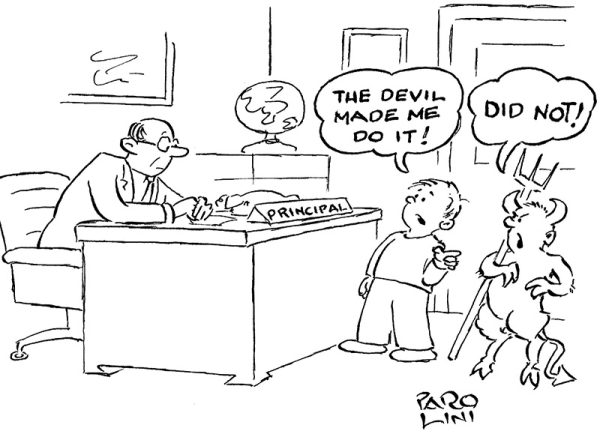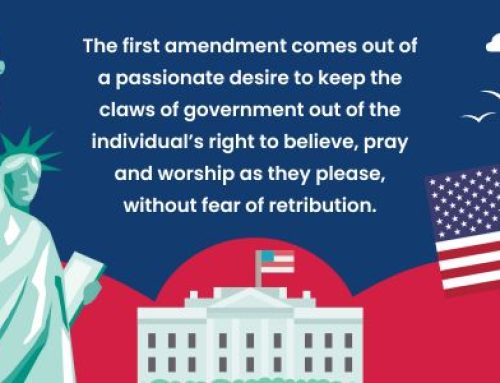Back in the 70s, comedian Flip Wilson created a character called ‘Geraldine.’ Do you remember Geraldine? Everything that happened to Geraldine happened because of one thing: “The Debil made me do it!” Geraldine was indicative of the cultural milieu that was taking place…accountability, or the lack of it. Like Geraldine, people refused to be accountable for their words and actions. Conveniently for Geraldine, she didn’t blame society or parents, but the Debil was responsible for her behavior.
 Today, there are still those who conveniently blame their misfortunes on the devil…Satan, the adversary, Beelzebub, Mephistopheles, The Great Deceiver, the angel of light, the evil one, or whatever you choose to call him/her.
Today, there are still those who conveniently blame their misfortunes on the devil…Satan, the adversary, Beelzebub, Mephistopheles, The Great Deceiver, the angel of light, the evil one, or whatever you choose to call him/her.
Why do we assume that Satan has to be a him, just like we assume God has to be a him? This discussion is a matter for another day.
I have to confess to you, I don’t believe in an anthropomorphic, physical devil, one that has human form, any more than I believe in an anthropomorphic, physical God. That is, one who’s seen in human configuration.
Scripture tells us two things about God…that God is spirit (I John 4:24) and God is Love (I John 4:8 and 4:16). These are qualities that are not definable in the physical realm, but realized in the spiritual and emotional realm. It is the character of Satan to abuse, misuse, and create deception in our body and mind to distort the reality of Spirit.
In the Old Testament there are three references to Satan: in 1 Chronicles 21:1ff, Job 2:1ff, and Zachariah 3:1ff. The literal meaning of the Hebrew is adversary and refers to one who brings adversity to a situation.
In the New Testament, the Greek word “Diabolus” appears 37 times. The most common meaning is the diabolical one, one who deceives, or tricks—he is the great deceiver.
For our purposes today, I would like to refer to this force or power of evil as “The Great Deceiver” who distorts and covers the truth. It is important to understand that The Great Deceiver can be anything or anyone (even presidents) that challenges our basic core values.
It could be:
- the church, which can sometimes be a deceiver
- the institution of education that sometimes deceives the minds of children
- the law, which sometimes makes a mockery of justice
- any government that suppresses basic human rights and denies individual freedom
- certainly the institution of entertainment like Hollywood and TV, that shocks and demoralizes our sacred Christian values
- advertisers that tell us that happiness is based on the consumption of their products
- individuals who promote and deceive through drugs, alcohol, sex, etc.
Mind you, I said The Great Deceiver challenges us. The deceiver does not make us do anything we don’t already intend to do, just as God does not make us do anything.
We are uniquely created individuals with the ability to make choices. Again, it is we, you and me, that do the choosing–that is the nature of free will. We choose our lifestyle, we choose our values, and we choose to serve God or not. We choose to become deceivers or not. Neither God nor The Great Deceiver can choose for us. It is an act that only we can commit to. Accountability is ours.
 So what can we do to shut that door and keep out de debil, to keep the Great Deceiver at bay?
So what can we do to shut that door and keep out de debil, to keep the Great Deceiver at bay?
Paul’s letter to the Colossians sets the stage for several resolutions, or agreements, we can make with ourselves and God to keep that door shut on the debil.
We are reminded in verse 3:17, “whatever we do, in word or deed, do it as we are doing it unto Jesus.” I believe that the author, most likely Paul, is working on an assumption here. Prior to verse 17 he lists things one could do to be seen as God’s chosen people. You remember,…clothe yourself with kindness, compassion, humility, patience, be forgiving, then, as if the list would go on and on, he simply says every word you speak, every act you do, do it as you are doing it unto Jesus. After all, the gospel of Matthew 25 reminds us that “inasmuch as you have done it unto the least of these, you have done it unto me.”
In order to make this verse complete, we would need to add thought, even though it is implied. Prior to our words and any deed are the thoughts that bring word and deed into fruition. Therefore, the verse would read, whatsoever we do in thought, word, or deed, do it as we are doing it unto Jesus. Or, even more accurately, doing it unto Love.
You remember in the Sermon on the Mount, Jesus talking about adultery said, “If you even think about a woman lustfully, you have committed sin in your heart…” The point being, it is the thought that really counts!
To further illustrate the context of this Colossians verse, I would like to refer to a book by Don Miguel Ruiz titled “The Four Agreements” and relate them to the core of our text. The four agreements are four particular spiritual teachings from an ancient Mexican tradition known as Toltec. The keepers of this knowledge were most likely responsible for the Mexican pyramids. I think these agreements, like those listed in Colossians, can amplify the Colossian teaching.
First Agreement: BE IMPECCABLE WITH YOUR WORD
This resolution has to do with our words. Words are powerful. They can create dreams and possibilities, or they can destroy everything around us. Depending on how they are used, they can set you free or destroy you.
Words offer a very potent power of suggestion. You’re ugly, you can’t sing a lick, you’re stupid, you’re beautiful, what a lovely voice you have.
What does it mean to be impeccable? Peccable comes from the Latin, PECATUS, which means sin. Adding the prefix IM, it means without, so impeccable means “without sin.” Today it seems that our culture uses words in ways that are not impeccable. We hear words around us used to curse, blame, find guilt, destroy, and create anger, hate, jealousy, envy, and gossip.
To be impeccable with your word means to use words that create harmony, peace, and love. Use your words to build up. Whatsoever you do in word, do as you are doing it unto Jesus.
How much you love yourself and how you feel about yourself are directly proportional to the quality and integrity of your word. As proverbs remind us, “As a man thinks in his heart, so he is.” So to shut the door on hurt and misunderstanding, be impeccable with your word.
Second Agreement: DON’T TAKE ANYTHING PERSONALLY.
This may seem unusual, but how do you not take things personally, especially when someone says you are stupid?
Taking things personally is the maximum expression of selfishness because we make the assumption that everything is about us. Know that nothing other people do is because of you, but because of themselves, who they are. When someone says something negative to you, what they say, what they do, and the opinions they give are based on their own misunderstandings and belief systems. Most likely, if someone calls you ugly, it’s because they do not see the beauty in themselves.
What’s important is how you see yourself, and the basis of that perception should be to know unconditionally that you are a beloved and worthy child of God—God knows us through and through. As the Psalmist proclaims in 139:14, “we are fearfully and wonderfully made.” When you can shut the door on the opinions and actions of others, you are finding your personal freedom in the spirit, and no longer need others to inflate your ego.
Third Agreement: DON’T MAKE ASSUMPTIONS.
Most assumptions are based on misunderstandings when we have been less than impeccable with our word. We create a lot of emotional poison when we make assumptions and spread them as opinions of truth. Assumptions are often based on what we want to see and what we want to hear, as opposed to the way they really are.
Shaky relationships, especially in marriage, are fraught with misguided assumptions. We make assumptions that our partner knows what we want. When our needs aren’t met, we blame and are vindictive…how could you do that…don’t you know me?
We make assumptions because we don’t have the courage to ask questions. We assume others think the way we think and feel the way we feel, and judge and abuse the way we judge and abuse. We even make assumptions about ourselves regarding what we can and can’t do. Jesus was very adamant about making assumptions about others…remember, judge not lest you also be judged.
If we keep our word impeccable and find the courage to always ask questions, we can keep the door of assumptions and judging others shut.
Fourth, And Final, Agreement: ALWAYS DO YOUR BEST.
This fourth agreement is really about the action of the last three…always do your best, no more, no less. But know that your best is never going to be the same from moment to moment. Sometimes your best will be high quality, other times not, but it will still be your best at that moment in time. As you practice the other three agreements, your best will improve over time.
In actuality, the first three agreements will only work if you do your best. Don’t expect that you will always be able to be impeccable with your word because your routine habits are firmly rooted in your mind, but do the best that you can. Don’t expect that you will never take anything personally; just do your best. Don’t expect that you will never make any more assumptions, but you can certainly do your best. By continuing to do your best in all situations, you will get better and better.
Practice does make perfect. Everything you have ever learned you learned through repetition. You learned to walk, talk, write, drive, play sports, all through repetition…practice. Likewise, doing your best is born of practice. Always work toward your best…I believe this is what Jesus had in mind when he said, “Be perfect even as your father in heaven is perfect.”
Again, in review:
- BE IMPECCABLE WITH YOUR WORD
- DON’T TAKE ANYTHING PERSONALLY
- DON’T MAKE ASSUMPTIONS
- ALWAYS DO YOUR BEST
Or, to say it another way, whatsoever you do in thought, word or deed, do all in the name of Love…and you CAN shut de dor, and keep the debil in the dark.




